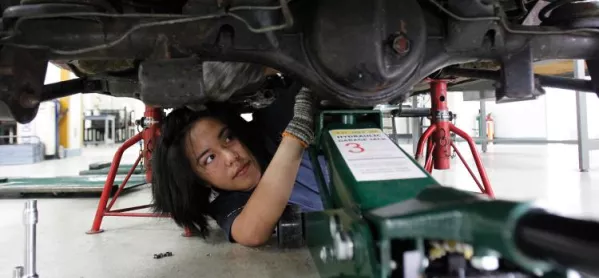- Home
- ‘Forget technical and professional education: there’s nothing wrong with the word vocational’
‘Forget technical and professional education: there’s nothing wrong with the word vocational’

There are at least three ways of raising the quality of vocational education. We can look at assessment (as Baroness Wolf did so effectively five years ago), we can look at structures and systems (as Lord Sainsbury has done recently) or we can focus on workforce capability and pedagogy (as we have argued in our research into vocational pedagogy).
Whichever method we prefer - and we need all three - we need first to specify the outcomes we desire from our vocational pathway before designing systems, qualifications and pedagogies. Our choice of language needs to follow not precede such thinking.
Lack of clarity
The Technical and Further Education Bill is in its committee session at Westminster as I write. Two cheers for that.
MPs would not be having these discussions were it not for the work of Sainsbury and Wolf. So why only two cheers?
At a recent conference, Lord Sainsbury was asked about what “technical” and “professional” actually mean. He was strangely unsure, suggesting that their meaning was too obvious to require explanation.
He has also said that we should not use the term “vocational” any more, arguing that vocational is defined not by what it is, but by what it is not: the academic option. This is a subjective view not supported by the evidence.
There are four clear reasons why ditching vocational in favour of technical and professional is problematic:
- Too close to a Brexit moment for comfort
Vocational education equips learners with the knowledge, know-how, skills and capabilities to be successful in a particular occupation or, more broadly, in a labour market that calls for adaptability.
Vocational is a broad and ambitious term just as academic is. Elsewhere in the world it is called “vocational education”, often with the addition of “technical” and sometimes with “training” as in the acronym TVET.
This choice of vocabulary doesn’t stop anyone talking about technical or professional or, indeed, practical education. It is flawed logic to say that vocational is defined by what it is not when the rest of the world is quite clear about what it is.
- Too narrow
“Professional education” is learning fit for a profession and, apart from curious exceptions such as “professional footballer”, implies a certain kind of higher level learning. Of the 15 pathways suggested, it may suit, for example, childcare and education but not health and beauty.
“Technical education” is actually rather a vague term and interestingly not defined in the Sainsbury report despite the claim that it is “well understood”.
“Technical” in the Oxford dictionary is the adjective “relating to a particular subject, art or craft or its techniques”. When used with the word “skills” it can relate to the kinds of technical skills required by engineers, hairdressers, electricians or accountants, for example. But it does not work well for social workers or nurses.
For many people these terms are not equal. Professional and professionals have a higher status than the technical and technicians.
- Too theoretical
Neither technical or professional works well for the many occupations which would see themselves as largely working with their hands. Indeed it is likely to perpetuate an even more corrosive split between practical and theoretical than academic versus vocational.
- Too fragmentary
Subdividing vocational into technical and professional complicates rather than simplifies the debate. Technical and professional are sub-elements of vocational and each term comes freighted with its own baggage.
Much of what Lord Sainsbury is proposing is eminently sensible. The recommendations dealing with the need for a coherent technical alternative to academic education are good if “technical” is replaced by “vocational”.
One qualification for each of 15 vocational routes is a helpful clarification of the current muddle, a logical continuation of Wolf’s cull of dead-end examinations.
At higher education level, vocational education has a good reputation and there is a lot of it going on. Early signs suggest that the new degree apprenticeships are recruiting people with good “academic” qualifications.
Nothing wrong with ‘vocational’
In other words there’s nothing wrong per se with the word vocational. Indeed the word brings with it useful semantic associations - worth, pride and dedication.
By contrast, neither technical nor professional is ambitious or broad enough for me. Both muddle thinking rather than clarifying it.
I am not alone in thinking like this. The National Foundation for Educational Research in their recent review of technical education reminds us: “The evidence reviewed reveals the definitional challenges of a lack of universal understanding of what is meant by ‘vocational’, ‘technical’ and ‘professional’ education. It points to clarity in terms of what constitutes effective vocational teaching and learning but does not provide enough evidence to identify the components of effective technical education.”
I want to give three cheers to any serious-minded attempt to improve vocational education. But to do so I need to be reassured that post-16 plans are genuinely aspirational and that the language we are choosing accurately reflects the level of our ambition.
Professor Bill Lucas is director of the Centre for Real-World Learning at the University of Winchester and an international adviser to the Mitchell Institute. He is the author of Remaking Apprenticeships: powerful learning for work and life and How to Teach Vocational Education: a theory of vocational pedagogy
Want to keep up with the latest education news and opinion? Follow TES FE News on Twitter, like us on Facebook and follow us on LinkedIn
Keep reading for just £1 per month
You've reached your limit of free articles this month. Subscribe for £1 per month for three months and get:
- Unlimited access to all Tes magazine content
- Exclusive subscriber-only stories
- Award-winning email newsletters



